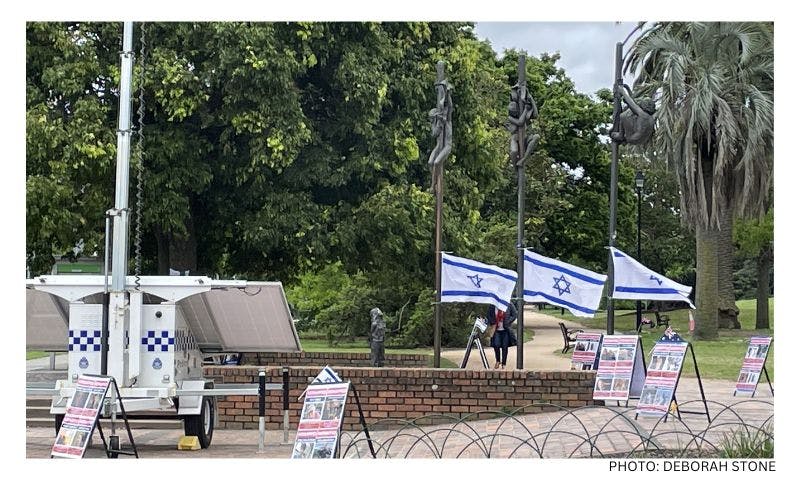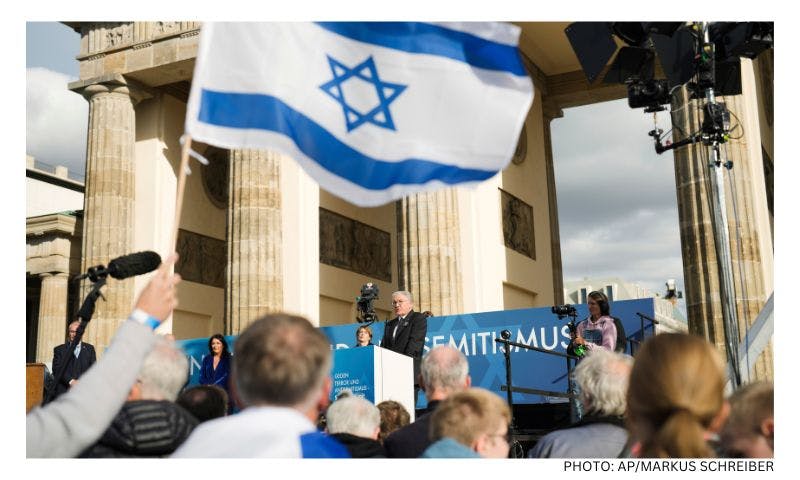Published: 3 May 2022
Last updated: 4 March 2024
PHILIP MENDES: The BDS movement is informed by ultra-nationalist values rather than emancipatory aspirations
IN RECENT WEEKS, some commentators - mostly associated with far Left and/or ultra-nationalist Palestinian perspectives - have opined that the international community should extend their sanctions against Russia to the State of Israel. According to this simplistic argument, the continuing Israeli occupation of the West Bank and blockade of Gaza is the equivalent of Russia’s invasion of the Ukraine - and deserves the same global punishment.
The obvious riposte here is that no two conflicts are the same in terms of origins or responsibility. But more specifically, I have long argued that the BDS movement is a case study of ethnic stereotyping whereby the entire population of Israel (or at least the majority Jewish segment) is demonised as an evil oppressor group.
That judgment of BDS as an overtly malevolent phenomenon both in terms of intent and actions is not changed one iota by the recent horrific but unrelated events in Eastern Europe.
Nobody is calling for the dismemberment of Russia as a national state or demanding that the Ukrainians become the dominant ethno-national group within Russia’s recognised borders.
Even if there were some relevant commonalities or lessons from events in Europe that might help inform conflict resolution in the Middle East, there is little if any similarity between the respective boycott approaches.
Unless I have missed something, nobody in the United Nations is calling for the dismemberment of Russia as a national state or demanding that the Ukrainians or any other people become the newly dominant ethno-national group within Russia’s internationally recognised borders.

In contrast, the BDS movement demands the end of Israel’s existence as a Jewish state, and its replacement by an ethnocentric Arab State of Greater Palestine in which Jews at best would be allowed to remain as a tolerated religious minority. The global guru of the BDS movement, Omar Barghouti, has consistently emphasised that they demand ‘a Palestine next to a Palestine, rather than a Palestine next to Israel’.
The reason for this is that the BDS movement is a reactionary old-fashioned movement that mirrors the earlier hardline Fatah position (pre-the 1993 Oslo peace accord or at least the PLO’s implicit recognition of Israel in late 1988) in favour of a united Arab national state of Palestine replacing Israel. Fatah did not believe that Israeli Jews were a national group entitled to national self-determination.
Nor do Barghouti and his core followers today. The leading BDS advocates are not disillusioned liberals who were emotionally mugged (to paraphrase the famous line of American neo-conservative Irving Kristol) by the failure of the Oslo Accord to deliver a two-state solution. Rather, they remain conservative ultra-nationalists who were never genuine supporters of two states in the first place.
A core demand of the BDS movement is for an end to Israeli occupation and colonization of ‘all Arab lands’ which is rightly interpreted as referring to Israel’s internationally recognized Green Line borders, not just the West Bank.
BDS demands the end of Israel’s existence as a Jewish state, and its replacement by an ethnocentric Arab State of Greater Palestine in which Jews would be allowed to remain at best as a religious minority.
In fact, the movement does not specifically campaign for an end to the Israeli military presence in the West Bank or the removal of Jewish settlements from the West Bank, or more generally for an end to the Israeli control of that territory that would enable Palestinian statehood alongside Israel.
The movement claims to be informed by universalistic human rights principles such as self-determination, freedom and equality, but selectively applies those principles only to Palestinians not Israelis. Indeed, two of its most prominent activities at least implicitly advance an agenda of discrimination against Israeli Jews and Jews more generally:
One tactic which we have witnessed locally in recent months (i.e. in regards to the Sydney Festival and the Melbourne-based Queer Film Festival) is the bullying and harassment based on ethno-national prejudice of individual Israelis - academics, artists, sports people etc. - who do not represent the Israeli government and in many cases are paradoxically known to be critical of Israeli government policies towards the Palestinians.
Another is the vitriolic attack (also based on ethnic prejudice) directed against Jews globally who support Israel’s existence. In many cases, the BDS movement ironically target progressive Jews who are aligned with dovish groups inside Israel that actively seek to advance Palestinian national self-determination via a two-state solution.
The aim of these attacks against any defenders of Israel, whatever their viewpoint on conflict resolution, is to silence the Israeli narrative from public discourse.

I do not mean to imply here that there are no legitimate comparisons to be drawn from other arenas of conflict. Given that we live in Australia, the long struggle of the nearby people of East Timor/Timor-Leste for freedom from Indonesian occupation may provide some useful learnings. But it is important to remember the differences as well as the commonalities.
To the best of my knowledge, the East Timorese resistance never targeted Indonesian civilians within or beyond Indonesia, and never called for the dismemberment of the existing Indonesian national state. Additionally, as far as I can recall, many of the Arab countries which endorse and resource the BDS movement consistently voted against UN resolutions censuring the Indonesian occupation of East Timor on the grounds of solidarity with a fellow Muslim country.
The instigators of any boycotts against Israel would need to address key barriers on the Palestinian side as well as the Israeli side to effectively advance a 'two states for two peoples' solution.
There is currently no international campaign to boycott Israel specifically over its occupation of the West Bank and settlements. However, if hypothetically, a new global impetus was generated by international institutions and NGOs to impose boycotts over the occupation, then it would have to be judged on the specific merits of its arguments and policy agenda, i.e. whether it proposed a Palestinian state alongside Israel aimed at creating a sustainable two-state solution, or rather the dissolution of Israel as recommended by the BDS advocates.
Regardless, the instigators of any such boycotts would need to address key barriers on the Palestinian side (e.g. continuing violence against Israeli civilians within the Green Line, the major influence of Islamo-fascists such as Hamas on the Palestinian national movement, and the ongoing irredentist demands for a coerced return of 1948 Palestinian refugees to Green Line Israel rather than the proposed Arab state within the West Bank and Gaza) - as well as the Israeli side – to effectively advance a “two states for two peoples” solution.
Photo: BDS protest outside the Sydney Opera House in January




